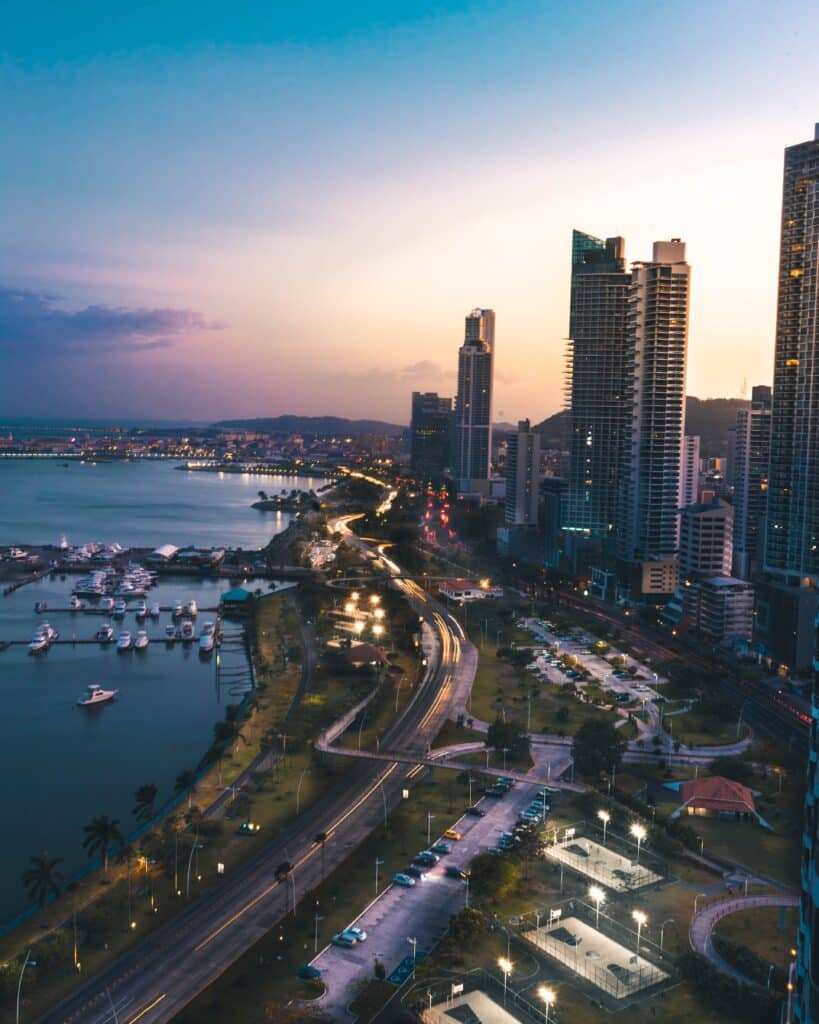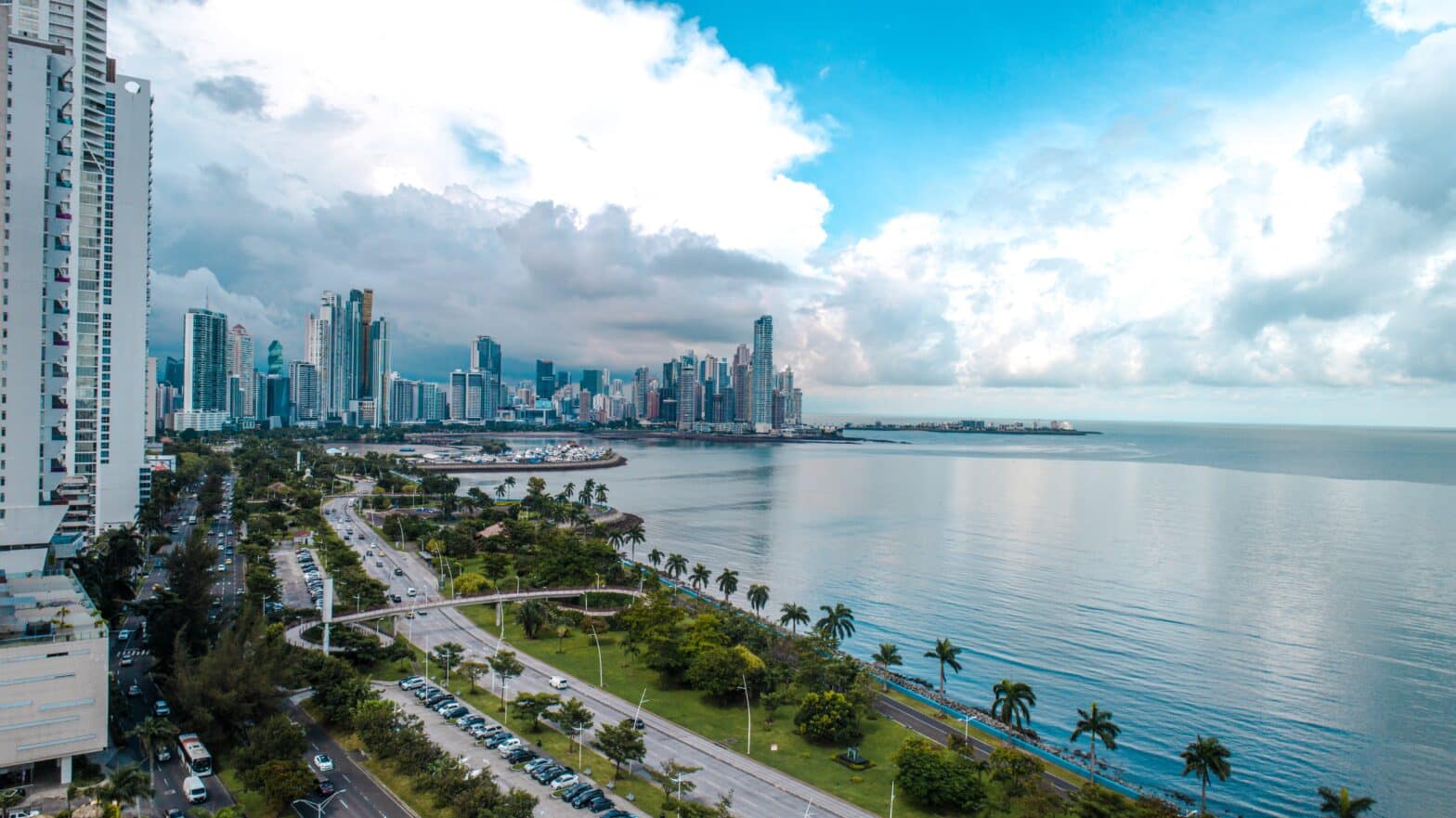Ready to set sail for Central America? Panama is a small tropical paradise nestled between the Caribbean and the Pacific, providing an idyllic living environment for tens of thousands of expats from around the world. With its spectacular scenery, favourable tax system, robust healthcare system and tropical climate, Panama attracts investors, expat families, solo digital nomads and retirees alike. Foyer Global Health is the guide to your relocation success in Panama.
Living in Panama: what are the advantages?
- A superb living environment: Panama has an extraordinary variety of natural resources
- A tropical climate, with a dry season from January to April and a rainy season from May to December
- Tax advantages for expatriates compared to Costa Rica and other Latin American countries
- A fast-growing economy linked to the operation of the Panama Canal and a prominent international financial hub. If you decide to set up a business there, it is relatively easy to set up a company.
- A relatively low cost of living for a Westerner in general compared with many other countries such as other Central American countries. The local currency is the Balboa or Pab (1 PAB = €0.91). The US dollar is also the official national currency, so you can pay in dollars if you wish.
- A welcoming country with investment opportunities in various sectors, including tourism, international trade, transport, etc.
Is it dangerous to live in Panama?
Most regions are generally safe. It is, however, recommended that one be vigilant, especially in the capital, where the risk of robbery and assault is higher than in other major western cities such as Paris or New York. Avoid certain areas of Panama City (especially at night), such as El Chorillo, Santa Ana or Tocumen: you could quickly be identified as a foreigner, and therefore easy prey. It is also not inadvisable to travel to the Darién region, on the border with Colombia, where there is a high-level of drug-related crime.
What kind of visa is required to move to Panama?
If you have a valid passport, there are several visas available for settling in the country, depending on your profile as well as the length and purpose of your stay. For example, the investor visa is suitable for those planning to invest in the country or set up a business there. If you’re more of a digital nomad, there are work visas to suit your profile, valid for nine months and renewable once.
Nationals of “friendly countries” (including France, Canada, the Netherlands and Belgium) can apply for a visa under the Paises Amigos residency programme. They can obtain a two-year residence permit and then permanent residency provided they are employed in Panama by a Panamanian company or have purchased a property for a minimum sum of USD 200,000.
The Panamanian government also strongly encourages foreigners to retire to the country and has created a special visa for this purpose (pensionados).
Some people use the services of relocation agencies to take care of all the administrative and logistical aspects of relocating.
Where is the best place to live in Panama?
Most expatriates, whether families, singles or couples, settle in Panama City, the country’s financial and cultural centre. The very modern Panamanian capital offers all the comforts of urban life, with a wide range of leisure activities, shops, educational and healthcare facilities and cultural centres to discover.
The work environment is very much in line with Western standards. Although the cost of living is higher here than in the rest of the country, Panama City is still more affordable than in many Western capitals such as Paris, Ottawa, London or Rome. Based on a comparable level of income, you will benefit from more spacious and better-located accommodation.
If you prefer the outdoors to the city air, you can anchor in Boquete, a picturesque mountain town with lots of flowers and a large expat community and delicious coffee! And if you’re after pristine beaches and a laid-back lifestyle, head to Bocas del Toro or Pedasi.

Accommodation
Villas, flats, shacks, houses, condominiums, new or old…you’ll be spoilt for choice when it comes to accommodation in Panama. Many expats opt for modern, comfortable residences equipped with all the amenities: gym, swimming pool, security service, etc. Housing prices vary according to the type of accommodation and the city in which it is located. Rents are highest in the capital; an average of €1,600 for a three-room apartment in the city centre. It is advisable to look for accommodation on arrival (unless your employer is paying for it), so that you can visit it in person and get a clear idea of the area in which it is located. To help you with your search, you can use the services of a specialist estate agent or use expat forums on social networking websites. It is entirely possible to negotiate the length of the lease and the rent.
Taxes in Panama
Expatriates in Panama can benefit from certain tax advantages, but the situation is not exactly the same as in Dubai. Despite Panama’s sulfurous reputation as a tax haven, fuelled by the Panama Papers scandal, the country does have a tax system. However, this system is based on the principle of territoriality. In short, only income from sources exclusively outside the country is exempt from tax. Both individuals and corporate entities are subject to income tax on income earned locally. The personal income tax rate ranges from 15% (for annual income between USD 11,000 and USD 50,000) to 25% (for annual income in excess of USD 50,000).
The Colon Free Zone (ZLC)
Located at the entrance to the Panama Canal on the Atlantic side, the world’s second largest free zone plays a key role in the Panamanian economy. Since its creation, it has attracted both national and international companies to set up their business activities there. Within this area, companies can import, store, process and re-export goods and merchandise, and benefit from certain tax advantages such as tax exemptions on profits generated outside the ZLC.
ITBMS (Impuesto de Transferencia de Biense Muebles y Servicios)
Generally set at 7%, ITBMS is a value-added tax that applies to a wide range of goods and services. Note that in shops, restaurants and supermarkets, ITBMS is not included in the advertised price, and a tip (between 10 and 25%) is very often required, as is the case in other countries such as Canada.
Healthcare
Medical services in Panama are provided by both the public and private sectors. The development of modern, efficient medical infrastructures is helping to boost medical tourism in the country at a lightning pace. As an expatriate, you can have access to high-quality public and private health services, particularly in big cities. Expatriates usually take out private international health insurance to be covered in the best private medical facilities in the country and around the world. To find out more about the health system in Panama, click here!
Top experiences to visit once you are settled:
- The impressive Panama Canal and the Casco Viejo district of Panama City
- Panama’s magnificent national parks, especially Cerro Hoya, Omar Torrijos and Isla Coïba
- Hike or horseback in Boquete and climb the Baru Volcano
- Swim in the Pearl Islands archipelago
- Dive off the islands of Achuputu or Coco Blanco in the San Blas archipelago
- Learn about the history of colonial maritime trade in the Caribbean and of the local pirates at Portobelo.
To find out more about our health insurance in Panama, click here:
